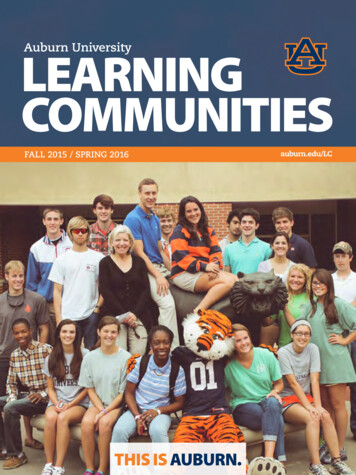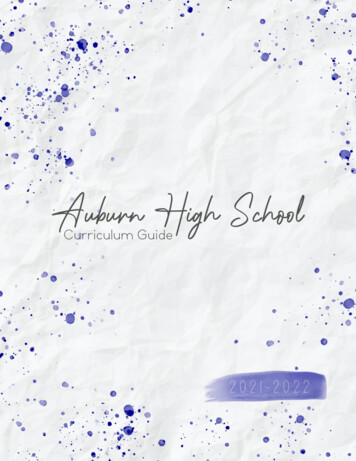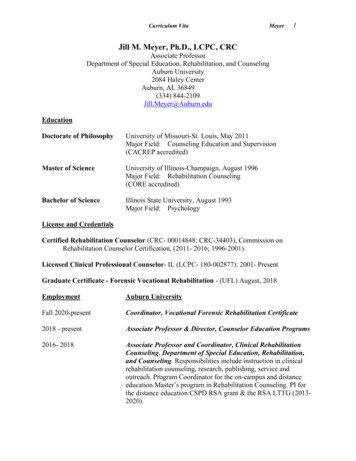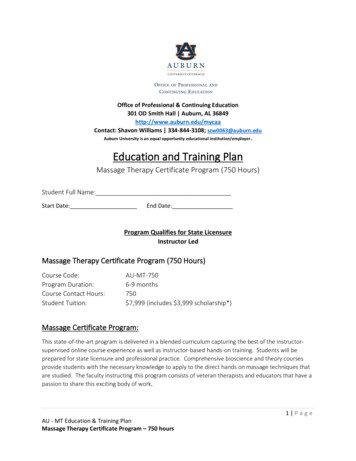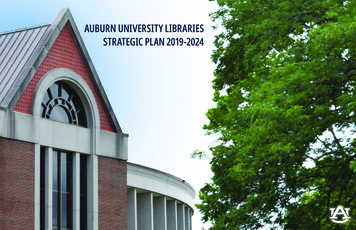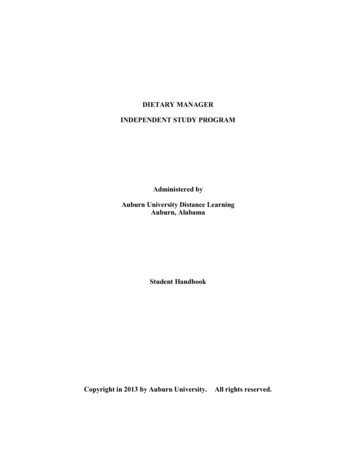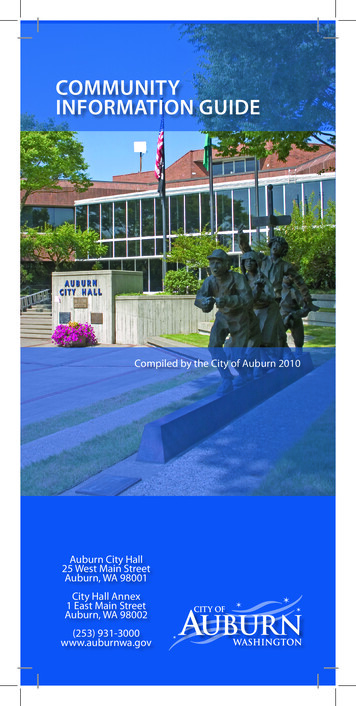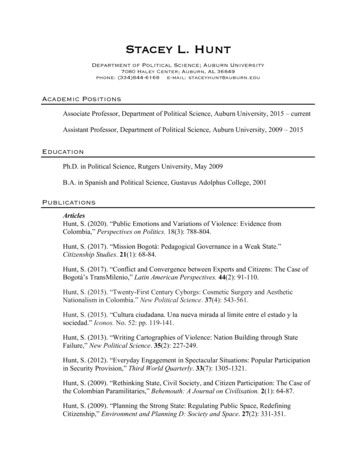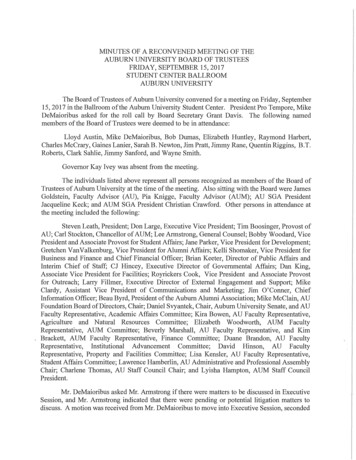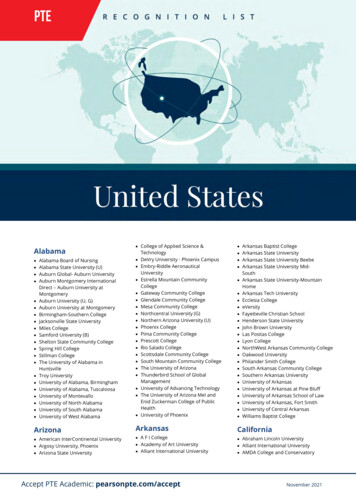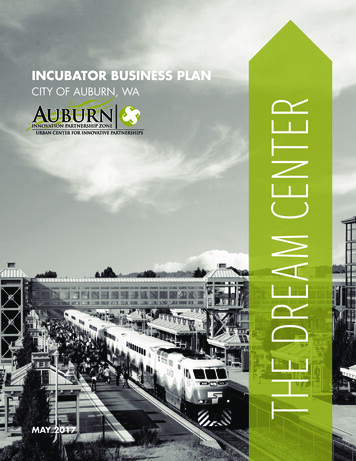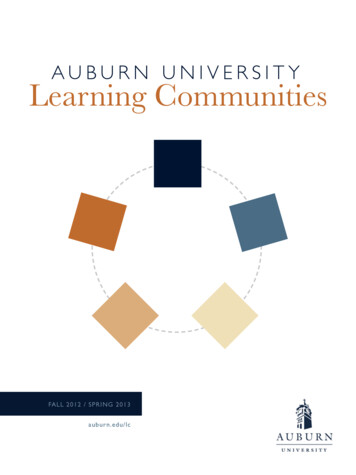
Transcription
AUBURN UNIVERSITYLearning CommunitiesFALL 2012 / SPRING 2013auburn.edu/lc
“I loved being in a learning communitybecause you already know the peoplein three of your classes and can feelcomfortable asking them for help.”– Human Sciences Learning Community Student
What is a learningcommunity?Learning communities are unique academic opportunitiesfor first year Auburn students. Each learning community iscomprised of 20 – 25 students who are co-enrolled in threecore courses surrounding a particular theme or interest.The cohort courses fulfill most major requirements,depending on the college or school.By participating in a learning community, students areinvolved in an environment that helps them transition tocollege through faculty interaction, which provides studentretention and academic success. Students are also exposedto a small community of peers with similar academicinterests and a supportive network of fellow students,peer educators, and professors.What are thebenefits?Relationships with ProfessorsFocus on Major or InterestLearning Community ActivitiesPeer InstructorsStudy SessionsIt’s FREE1
Living-LearningCommunityhousing optionsEach of Auburn’s learning communities has a designatedhousing residence hall or area its members can applyto live in. You must be guaranteed housing to takeadvantage of this residential option. If you have appliedfor housing, you have received an email to your TigerMail(Auburn email) account informing you as to whetheror not you have been guaranteed a space in on-campushousing.When you apply up to live with your learningcommunity, you will be placed in the hall or area(s)designated for that community. Visit our website atauburn.edu/lc to see what housing options areavailable for each learning community. As spacepermits, roommate requests will be honored, evenif your roommate is not in the same learningcommunity. However, roommates must be membersof a learning community in order for you to be placedtogether. If you are unsure of your housing status,please contact the Housing and Residence Life Officeat housing@auburn.edu or (334) 844-4580.How do I join?Visit auburn.edu/lc to find detailed instructions underthe “Apply for a Learning Community” link. Applicationswill be accepted until all spaces are filled but studentsare encouraged to apply early as spaces fill up quickly.For Questions Contact:lc@auburn.edu or (334) 844-57212Attention: Ruthie Payne or Chris Wyckoff
Auburn Connects!T he C ommo n B oo k P ro g ramAuburn Connects! is a reading program, sponsored byAuburn’s Provost, featuring a specially chosen book thatwill be integrated into many university courses. First-yearstudents will have the opportunity to attend lectures oncampus, join discussion groups, participate in service learningprojects, and increase awareness of global issues.Her name was Henrietta Lacks, but scientistsknow her as HeLa. She was a poor Southerntobacco farmer who worked the same landas her slave ancestors, yet her cells—takenwithout her knowledge—became one of themost important tools in medicine. The first“immortal” human cells grown in culture, theyare still alive today, though she has been deadfor more than sixty years. If you could pile allHeLa cells ever grown onto a scale, they’dweigh more than 50 million metric tons—asmuch as a hundred Empire State Buildings.HeLa cells were vital for developing the poliovaccine; uncovered secrets of cancer, viruses,and the atom bomb’s effects; helped lead toimportant advances like in vitro fertilization,cloning, and gene mapping; and have beenbought and sold by the billions.Yet Henrietta Lacks remains virtuallyunknown, buried in an unmarked grave.3
Learning Communities by MajorAGRICULTUREThe College of Agriculture Learning Communities offer agriculture students an easy transition to both the College ofAgriculture and Auburn University as a whole. Students in each learning community will be exposed to different resourcesand opportunities available to them in the college and will get to meet faculty and administrators who will support themthroughout their undergraduate career. The College of Agriculture believes participating in their learning communities isan important step in being successful at Auburn. Each learning community will take multiple classes together and offers theopportunity to live in the same residence hall if students choose to do so.Agriculture Learning CommunityThe Agriculture Learning Community offers the opportunity to meet faculty and other students in the college and learnabout opportunities and resources for College of Agriculture students.FALL SPRINGUNIV 1100 : Agriculture Special TopicsAGRI 1000 : Introduction to AgricultureHIST 1010 : World History IHIST 1020 : World History IIBIOL 1020 : Principles of BiologyBIOL 1030 : Organismal BiologyBIOL 1021: Principles of Biology LabBIOL 1031: Organismal Biology LabPre-Vet Learning CommunityInterested in exploring a career in veterinary medicine? Students in this learning community will concentrate onpreparation for graduate studies in the field of veterinary medicine. Students will learn about expectations and processesof applying for veterinary school and will meet faculty and upperclassmen in the pre-veterinary major.FALL SPRINGUNIV 1100 : Pre-Vet Special TopicsAGRI 1000 : Introduction to AgricultureHIST 1010 : World History IHIST 1020 : World History IICHEM 1030 : Fundamentals of Chem ICHEM 1040 : Fundamentals of Chem IIArchitecture, Design& ConstructionThe College of Architecture, Design and Construction learning communities are for all incoming students in the college.Students in each learning community will be exposed to different resources and opportunities available to them inthe college and will get to meet faculty and administrators who will support them throughout their undergraduatecareers. The College of Architecture, Design and Construction embraces the belief that to be successful in their fields,students need to collaborate across disciplines and practice their disciplines in the community through service. CADClearning communities accomplish these goals through hands-on experience, working in service-learning groups.Longview Learning Community: Exploring Environmental Longevity in Construction and DesignThe Longview Learning Community will take several classes together focused around the themes of environmentallongevity ideas for construction and design, civic engagement through service learning, and interdisciplinary partnerships.FALL SPRINGUNIV 1100 : Make a DifferenceUNIV 1050 : Success StrategiesHIST 1010 : World History IHIST 1020 : World History IIANTH 1000 : Intro to AnthropologyHumanities CoreENGL 1100 : English Composition IENGL 1120 : English Composition II4
GreenHouse Learning Community: Green Practices in Construction & DesignThe GreenHouse Learning Community will take several classes together focused on using green practices in construction anddesign, community involvement through hands-on learning, and interdisciplinary partnerships. This community is specifically forstudents in Building Science.FALL SPRINGUNIV 1100 : Make a DifferenceUNIV 1050 : Success StrategiesHIST 1010 : World History IHIST 1020 : World History IIECON 2020 : Principles of Micro EconomicsHumanities CoreENGL 1100 : English Composition IENGL 1120 : English Composition IIbusinessBusiness Learning CommunityFrom marketing to accounting to finance, the Business Learning Community provides all entering pre-business students withexposure to a multitude of degree paths and resources within the college. This learning community will offer students an introduction to the foundations of a business education and prepare students to excel in a global society.FALL SPRINGUNIV 1000 : Auburn ExperiencBUSI 1010: Contemporary Issues in Business AdministrationACCT 2700: Business LawHIST 1010 : World History IHIST 1020 : World History IIENGL 1100 : English Composition IENGL 1120 : English Composition IIECON 2020: Principles of MicroeconomicsEDUCATIONEducation Learning CommunityThe Education Learning Community offers incoming students opportunities to connect with other education students, facultyand administration within the College of Education. Members of this community will engage in organized activities to enhanceand promote collaboration, advocacy and diversity – all of the necessary building blocks to become a successful educator!FALL SPRINGUNIV 1150 : Education Special Topics*PHIL 1000 : Introduction to PhilosophyENGL 1100 : English Composition IENGL 1120 : English Composition IIPSYC 2010 : Introduction to PsychologyFine Arts CoreENGINEERINGEngineering Learning CommunityThe Samuel Ginn College of Engineering has a long and superior reputation for providing Auburn students with a firmgrounding in an engineering education, dating back to the 1870s. The Engineering Learning Community welcomes freshmeninto this tradition and provides them with a supportive environment to meet others who are enrolled in their curriculumand facing the challenges of pre-engineering. This community will take several classes together and students in the communityhave the option to live together in an on-campus residence hall. Math placement will be determined prior to studentscoming to Camp War Eagle and placement in Chemistry or Physics will be determined by the Engineering Advising Office.Students participating in the Alabama Power Engineering Program or the Honors College are discouraged from applying dueto scheduling conflicts.FALL SPRINGUNIV 1150 : Engineering Special Topics*Java, MatLab, CProgrammingMATH 1130/1150/1610 : Pre-Calculus/CalculusMATH 1610/1620 : Calculus/Calculus IICHEM 1130/PHYS 1600 : Chemistry I/Physics ICHEM 1040/PHYS 1600/PHYS 1610 : Chemistry II/Physics I/Physics II5* Freshmen seminar with learning strategies
(Engineering Continued)Women in Science and Engineering Learning CommunityThe Women in Science and Engineering (WISE) Learning Community seeks to create a healthy and supportive communityof learners and friends, provide opportunities for leadership development, improve the retention of women in Science,Technology, and Engineering Majors (STEM) and to create long-term personal and professional relationships betweenstudents. The WISE learning community is sponsored by the Women’s Resource Center in the Office of Diversity andMulticultural Affairs.FALL SPRINGUNIV 1150 : WISE Special Topics*PSYC 2010 : Introduction to PsychologyENGL 1100 : English Composition IENGL 1120 : English Composition IIHIST 1010 : World History IHIST 1020 : World History IICHEM 1030 : Fundamentals of Chemistry ICHEM 1030 : Fundamentals of Chemistry IIScientific Computing Learning CommunityIn order to maintain its competitive economic, scientific, and strategic edge, the United States needs to continue to advancethe field of computational science. As a result, a greater number of mathematicians, scientists, and engineers will needto be trained in scientific computing and skills neccessary to develop new and efficient simulation tools. Students in thislearning community will be introduced to basic skills and technology utilized in the innovative and growing field of scientificcomputing. Math placement will be determined prior to Camp War Eagle.FALL SPRINGUNIV 1100 : Scientific Computing Special TopicsJava, MatLab, CProgrammingMATH : Pre-Calculus with Trigonometry or Calculus IMATH : Calculus I or Calculus IIHIST1210 : Technology and Civilization IHIST 1220: Technology and Civilization IIFORESTRY & WILDLIFEForestry and Wildlife Learning CommunityThe Forestry and Wildlife Learning Community is a fellowship of students who share a common interest in our naturalresources, and who are new to Auburn University’s School of Forestry and Wildlife Sciences. They are united by their love ofthe outdoors and a passion for studying techniques to protect, understand and utilize the wilder lands in our world.FALL SPRINGUNIV 1150 : Forestry & Wildlife Special Topics*FOWS 1010 : Introduction to Renewable ResourcesBIOL 1020 : Principles of BiologyBIOL 1030 : Organismal BiologyBIOL 1021: Principles of Biology LabBIOL 1031: Organismal Biology LabENGL 1100 : English Composition IENGL 1120 : English Composition IIHUMAN SCIENCESHuman Sciences Learning CommunityThe Human Sciences Learning Community takes classes together and participates in events organized by the college such asspecialized academic advising sessions; college wide initiatives for student learning and student development; opportunities tolearn more about study abroad opportunities to broaden world views for personal and professional development.FALL SPRINGUNIV 1150 : Human Sciences Special Topics*CAHS 2000 : Global Consumer CultureENGL 1100 : English Composition IENGL 1120 : English Composition IIHDFS 2000 : Marriage and Family in a Global ContextARTS 1730 : Introduction to Art History III6
LIBERAL ARTSLiberal Arts Learning CommunityInterested in a Liberal Arts degree? Graduates in the liberal arts go on to be outstanding leaders in their professions andin their communities. The Liberal Arts Learning Community will orient its members to the College of Liberal Arts andexplore major and career choices available to them.FALL SPRINGUNIV 1150 : Liberal Arts Special Topics*BIOL 1010 : Survey of LifeHIST 1010 : World History IHIST 1020 : World History IIENGL 1100 : English Composition IENGL 1120 : English Composition IIBIOL 1000 : Intro to BiologyLiberal Arts and Civic Engagement Learning CommunityThe Liberal Arts and Civic Engagement Learning Community explores how liberal arts disciplines impact society andenrich the human experience. Students will learn the foundation of becoming and active member in the Auburncommunity both in the classroom and by partnering with local non-profit organizations and schools.FALL SPRINGUNIV 1100 : Liberal Arts Special TopicsHIST 1020 : World History IIHIST 1010 : World History IENGL 1120 : English Composition IIENGL 1100 : English Composition IPSYC 2010 : Intro to Pscychology**CCEN 2000 : Intro to Community and Civic Engagement**LBAR 3910 : Practicum in Liberal ArtsNURSINGNursing Learning CommunityThe Nursing Learning Community is made up of freshmen in Auburn’s pre-nursing program. Students in this communitywill get to know upperclassmen who have been successfully admitted into the nursing program and faculty who will assistthem in their path towards completing a nursing degree.FALL SPRINGUNIV 1150 : Nursing Special Topics*ENGL 1120 : English Composition IIENGL 1100 : English Composition I NTRI 2000 : Nutrition and HealthBIOL 1020 : Principles of BiologyBIOL 1021: Principles of Biology LabSCIENCES & MATHEMATICSConservation Biology Learning CommunityThe Conservation Biology Learning Community exposes students to conservation biology, the study of biodiversity andhow humans can coexist with nature. Students will explore conservation biology through guest lectures by conservationprofessionals and researchers, readings, and experiential learning (participation in conservation events, attending meetingsof conservation-oriented student groups, a hands-on group conservation project, etc.). They will also discuss studentstrategies for success in the university environment.FALL SPRINGUNIV 1100 : Conservation Biology Special TopicsUNIV 1100 : Conservation Biology Special Topics IIENGL 1100 : English Composition IENGL 1120 : English Composition IIBIOL 1020 : Principles of BiologyBIOL 1030 : Organismal BiologBIOL 1021: Principles of Biology LabBIOL 1031: Organismal Biology Lab* Freshmen seminar with learning strategies** Optional Course. Students may elect for priority registration. Counts toward Civic Engagement minor.7
(Sciences and Mathematics Continued)Disease Hunters Learning CommunityWe live in an age in which new diseases appear and old diseases change with frightening frequency. In the Disease HuntersLearning Community College of Sciences and Mathematics freshmen interested in the study of diseases, both in people andanimals, will have the opportunity to investigate a number of emerging diseases and gain an introduction to the science ofepidemiology. This experience will give students’ a strong introduction to the study of diseases, giving them an advantage in theirupper level classes. Students will also learn about careers in epidemiology, how to get involved in research as an undergraduatestudent and have the opportunity to meet Auburn faculty who work on infectious diseases. All students interested in a betterunderstanding the diseases impacting the people and animals of our world are encouraged to apply.FALL SPRINGUNIV 1100 : Disease Hunters Special TopicsENGL 1120 : English Composition IIENGL 1100 : English Composition IBIOL 1030 : Organismal BiologyBIOL 1020 : Principles of BiologyBIOL 1031: Organismal Biology LabBIOL 1021: Principles of Biology LabMarine Biology Learning CommunityThe Marine Biology Learning Community provides freshmen an opportunity to explore various topics in marine biology, suchas marine conservation, animal behavior, biotechnology, sustainability and career options. The class may include field trips andother outside experiences. If you’ve been considering marine biology, here’s a great chance to get your feet wet early!FALL SPRINGUNIV 1100 : Marine Biology Special TopicsENGL 1120 : English Composition IIENGL 1100 : English Composition IBIOL 1030 : Organismal BiologyBIOL 1020 : Principles of BiologyBIOL 1031: Organismal Biology LabBIOL 1021: Principles of Biology LabMicrobiology Learning CommunityStudents in the Microbiology Learning Community will explore such topics as microbes and disease, biotechnology, agriculture,and career opportunities. With access to our microbiology faculty members, students in this learning community developsuccessful learning and study skills that enhance all aspects of the Auburn experience.FALL SPRINGUNIV 1100 : Microbiology Special TopicsENGL 1100 : English Composition IENGL 1120 : English Composition IIBIOL 1020 : Principles of BiologyBIOL 1030 : Organismal BiologyBIOL 1021: Principles of Biology LabBIOL 1031: Organismal Biology LabPre-Health Learning CommunityInterested in becoming a part of the ever-changing field of health care as a professional in medicine, dentistry, pharmacy,or physical therapy? Discover the various majors within the College of Science and Math that can lead to a professionalcareer of your choice. Students in this learning community will also be provided opportunities for hands-on learning inlocal community health care settings, as well as networking with health professionals in the Auburn area.FALL SPRINGUNIV 1150 : Pre-Health Freshman SeminarENGL 1100 : English Composition IENGL 1120 : English Composition IIBIOL 1020 : Principles of BiologyBIOL 1030 : Organismal BiologyBIOL 1021: Principles of Biology LabBIOL 1031: Organismal Biology LabScientific Computing Learning CommunityIn order to maintain its competitive economic, scientific, and strategic edge, the United States needs to continue to advance thefield of computational science. As a result, a greater number of mathematicians, scientists, and engineers will need to be trainedin scientific computing and skills neccessary to develop new and efficient simulation tools. Students in this learning communitywill be introduced to basic skills and technology utilized in the innovative and growing field of scientific computing. Mathplacement will be determined prior to Camp War Eagle.FALL SPRINGUNIV 1100 : Scientific Computing Special TopicsJava, MatLab, CProgrammingMATH : Pre-Calculus with Trigonometry or Calculus IMATH : Calculus I or Calculus IIHIST1210 : Technology and Civilization IHIST 1220: Technology and Civilization II8
Women in Science and Engineering Learning CommunityThe Women in Science and Engineering (WISE) Learning Community seeks to create a healthy and supportive community oflearners and friends, provide opportunities for leadership development, improve the retention of women in Science, Technology,and Engineering Majors (STEM) and to create long-term personal and professional relationships between students. The WISElearning community is sponsored by the Women’s Resource Center in the Office of Diversity and Multicultural Affairs.FALL SPRINGUNIV 1150 : WISE Special Topics*PSYC 2010 : Introduction to PsychologyENGL 1100 : English Composition IENGL 1120 : English Composition IIHIST 1010 : World History IHIST 1020 : World History IICHEM 1030 : Fundamentals of Chemistry ICHEM 1040 : Fundamentals of Chemistry IIUNDECIDEDExploring Majors Learning CommunityMost students change their major an average of three times while in college. If you are unsure what career path you wantto pursue at Auburn, this learning community is perfect for you! Coordinated by the Auburn University Career Center, thiscommunity offers students step-by-step assistance with navigating the majors at Auburn including a chance to meet withadvisors and participate in informational interviewing activities.FALL SPRINGUNIV 1150 : Major Exploration Special Topics*ENGL 1100 : English Composition IENGL 1120 : English Composition IIPSYC 2010 : Introduction to PsychologyCOMM 1000 : Public SpeakingInterdisciplinary LearningCommunitiesCAMPUS LIFEDiscover Auburn Leaning CommunityThe Discover Auburn Learning Community connects students to the campus, its traditions, and the surrounding communitythrough meeting campus leaders and learning about resources and opportunities for involvement at Auburn. If you believe inAuburn and love it, this learning community is for you.FALL SPRINGUNIV 1000 : Auburn ExperienceENGL 1100 : English Composition IENGL 1120 : English Composition IIHIST 1010 : World History IHIST 1020 : World History II* Freshmen seminar with learning strategies9
HEALTH & FITNESSWellness Learning CommunityAre you interested health and wellness? Interested in learning how to create a healthier Auburn University for the allmembers of the Auburn Family? Then the Wellness Learning Community is for you! Students in this learning communitywill gain necessary skills to promote all aspects of health and wellness for college students, including physical, mental,emotional, and nutritional health. This experience provides students the opportunity to connect with students who sharehealth interests across departments and disciplines.FALL SPRINGUNIV 1150 : Wellness Special Topics*PSYC 2010 : Intro to PsychologyENGL 1100 : English Composition IENGL 1120 : English Composition IIHIST 1010 : World History IHIST 1020 : World History IICOMM 1000 : Public Speaking KINE 1100 : WellnessLEADERSHIPLeadership Learning CommunityAspire to be a leader on Auburn’s campus? Plan to be a future leader in your community? The Leadership LearningCommunity is the choice for you. This learning community is designed to promote active involvement in the AuburnUniversity community and to provide opportunities for students to build upon leadership skills developed in highschool. Students are encouraged to participate in leadership opportunities at Auburn and are assisted in pursuingthose through involvement fairs, interview workshops, and other leadership development activities.FALL SPRINGUNIV 1150 : Leadership Special Topics*ANTH 1000 : Intro to AnthropologyENGL 1100 : English Composition IENGL 1120 : English Composition IICOMM 1000 : Public SpeakingPOLI 1090 : American GovernmentIntercultural Leadership Learning CommunityThe Intercultural Leadership Program has been designed to foster an intercultural community of leaders who areready to take on issues they are passionate about, learn more about communities different than their own, and makea lasting impact at Auburn and beyond. If you are open and committed to learning the skills of intercultural leadershipand motivated to share what you learn with your peers then this is the learning community for you.FALL SPRINGUNIV 1150 : Intercultural Leadership Special Topics*ENGL 1100 : English Composition IENGL 1120 : English Composition IIHIST 1010 : World History IHIST 1020 : World History IIProvost Leadership Undergraduate Scholars Learning CommunityThe Provost Leadership Undergraduate Scholarship (PLUS) Learning Community is a cross-disciplinary learningcommunity sponsored by the Office of Diversity and Multicultural Affairs. PLUS is a program predominantly for firstgeneration students and students from diverse backgrounds. The program assists students in academic and socialsuccess. Students must be recipients of the PLUS Scholarship to be a part of this community. Students should visitauburn.edu/odma for more information.FALL SPRINGUNIV 1150 : Leadership Special Topics*ENGL 1100 : English Composition IENGL 1120 : English Composition IIHIST 1010 : World History IHIST 1020 : World History II10
HUMANITIESLiving in a Global Community Learning CommunityThe Living in a Global Community Learning Community is for students who are interested in becoming engaged globalcitizens. Students with a passion for languages, culture, and travel will have the opportunity to examine how they canexplore these passions at Auburn and through interacting with a diverse community, majors, minors, involvementsopportunities, study abroad. Students will also have the option to be enrolled in an alternative spring break that earnscourse credit in the spring. Enrollment in foreign language or culture courses is highly recommended as support for theseclasses will be provided.FALL SPRINGUNIV 1100 : Global Special TopicsFLGC 1150 : Global Awareness and FluencySOCY 1000 : Sociology Global PerspectivePOLI 1050 : Global Politics and IssuesHIST 1010 : World History IHIST 1020 : World History II**LBAR 3910 : Practicum in Liberal ArtsPhilosophy and ArtsThe Philosphy and Arts learning community is particularly suited for students from all majors who are interested writing,theatre, film, architecture or philosophy. By fusing together the practical concerns of artists with the intellectual approachesof philosophy, literature, and theatre this interdisciplinary program lays the ground work for a reflective engagement withthe arts. Join other artistically and philosophically minded students for a freshman year that aims to sharpen and deepenone’s understanding and appreciation of the arts.FALL SPRINGUNIV 1150 : Philosophy and Arts Special Topics*Fine Arts CoreENGL : English Composition/LiteratureENGL : English Composition/LiteraturePHIL 1070 : Philosophy of Art, Value, and SocietyPhilosophy, Politics, and EconomicsThe Philosophy, Politics, and Economics learning community offers students an interdisciplinary intellectual foundation forthe study of social phenomena, combining the approaches of philosophy, politics, and economics. Students in law, politics,government, non-governmental organizations, and a broad spectrum of social, political and ethical issues will get an earlystart on their studies and a chance to work with like-minded peers. Students have het option of living together, and willenjoy early registration for these key classes, immediate faculty mentoring, and a warm welcome into the intellectual life ofthe University.FALL SPRINGUNIV 1100 : PPE Special TopicsPSYC 2010 : Introduction to PsychologyHIST 1010 : World History IHIST 1020 : World History IIPOLI 1050 : Global Politics and IssuesECON 2020 : Principles of MicroeconomicsPHIL 1050 : Intro to Political PhilosophySERVICEService Learning CommunityThe Community Service Learning Community is for all students who have a passion for service. Whether you simplyenjoy participating in community service or plan to pursue a career revolved around service this community is for you!Students will learn ways to get involved in service opportunities at Auburn both through their major and extracurricularinvolvement opportunities. Students will develop relationships with community groups and individuals and become awareof the many ways to make a difference in their lives.FALL SPRINGUNIV 1100 : Service Special TopicsPSYC 2010 : Intro to PsychologyENGL 1100 : English Composition IENGL 1120 : English Composition IISOCY 1000 : Intro to SociologySOWO 2000 : Intro to Social Work* Freshmen seminar with learning strategies** Optional Course. Students may elect for priority registration. Counts toward Civic Engagement minor.11
TRANSFER STUDENTSTransfer Learning CommunityTransferring to a new university introduces lots of changes such as a new campus, new classes, established networks, and newacademic expectations. The goal of the Transfer Learning Community is to offer transfer Students the opportunity to meetother transfer students and learn to easily navigate Auburn’s campus and resources. Students must call the learning communityoffice at 334-844-5721 to apply.FALLUNIV 1500 : Transfer Students Seminar*UPPERCLASSMENAuburn offers students the opportunity to stay involved in a learning community beyond the freshman year throughthe following opportunities. Students may apply for these starting spring semester of their freshman year to be a memberthe following year.AU Women LeadAU Women Lead is the first learning community for sophomores, junior, and seniors with an interest in taking a proactive rolein interacting with today’s leaders in politics, business, and institutions and engaging in real-life leadership roles in non-profitcommunities. The AU Women Lead learning community provides students an opportunity to discover their passions and putthem to practical use in order to prepare to become successful leaders in a variety of career paths. Get preregistered early forthese exciting classes and earn credit toward the Community and Civic Engagement and Women’s Studies Minors.Emerging Auburn Greek LeadersThe Emerging Auburn Greek Leaders or EAGLe Learning Community encourages students who wish to be the future leaderswithin the Auburn greek system to carefully analyze their respons
Auburn Connects! is a reading program, sponsored by Auburn's Provost, featuring a specially chosen book that will be integrated into many university courses. First-year students will have the opportunity to attend lectures on campus, join discussion groups, participate in service learning projects, and increase awareness of global issues.
